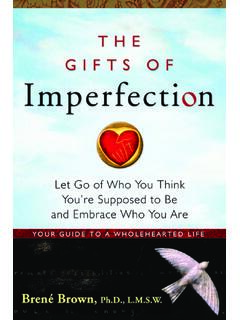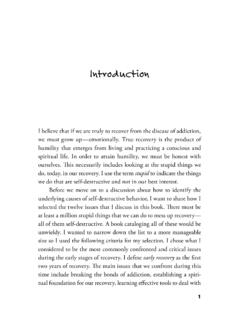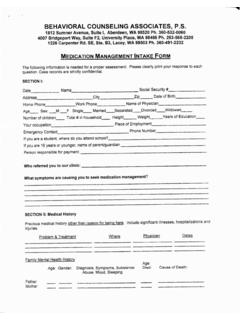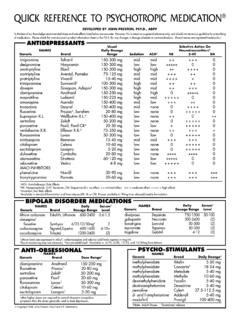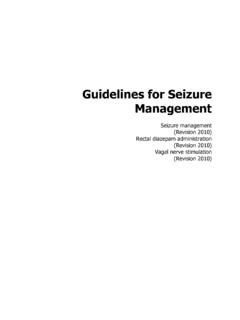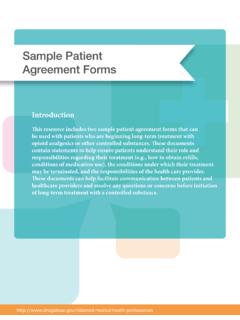Transcription of Stupid Thing 1 - Hazelden
1 Stupid Thing 1 Believing Addiction to One Substance Is the Only ProblemOur best chance for recovery lies in total abstinence from all mind-altering is quite common for men and women who are beginning recovery to minimize the extent and severity of their problem. When I was working as a clinical supervisor in an inpatient chemical dependency treatment program, patients would often try to convince me that they really didn t have a problem with the other drugs they were using; it was just the alcohol. Hearing these beliefs over and over again raised the following question: Why would someone trying to get help for a drinking problem, for example, ignore or minimize the fact that smoking marijuana is also part of the problem?The answer was simple: The person is trying to deceive him-self into thinking that he is normal and can control his behavior.
2 He desperately wants to believe that he can still get high, even though he might have to stop drinking. He does not want to see the truth: he is powerless over all mind-altering drugs. This kind of self-deception is prevalent in many shapes and forms. Alcoholics may fool themselves into thinking that they can no longer drink / 12 Stupid Thingswhiskey but can have a beer every now and again. There is a growing problem in AA of members saying they are sober while still occa-sionally smoking mind is remarkable in how it creates self-deception. We can keep ourselves from seeing the truth about ourselves and our behavior in many different ways. The technical term for this type of mental defense mechanism is compartmentalization.
3 When we compartmentalize a problem, we keep it isolated, or separated, from other relevant issues. In this instance, we compartmentalize our al-cohol or drug abuse. We keep an ace up our sleeve in case the going gets tough. Drinking or using is still an option. When we keep this kind of a secret, we are sabotaging our recovery. What we need to do is to share this secret tell the truth. When we do, we give ourselves a chance to connect the s an example from my own personal recovery. I returned to the United States from Vietnam in 1971 with a serious drug problem, as did thousands of other veterans. At that time, I mis-takenly believed that drugs other than alcohol were my prob-lem. I didn t even think of alcohol as a drug, which it is.
4 I was about three weeks into my recovery when I hitchhiked from the west side of Oahu to Honolulu to meet with Tom, my sponsor, and then go to an A A meeting. A local man picked me up in his Toyota Corolla. He had a six-pack of beer in his front seat. He of-fered me one of the beers, and without much thought, I thanked him and drank it. When Tom opened his door and greeted me, he looked disturbed because he could smell the alcohol on my breath. He asked me whether I had been drinking. I immedi-ately said I had had a beer and quite naively added that he didn t have to worry because I didn t have a problem with alcohol just drugs. He looked at me with that look that a sponsor has when he knows you are full of it.
5 He asked me to sit down, said we had a Stupid Thing 1 / lot to discuss. About three hours later, I realized that alcohol was a drug and that I was deceiving myself. I had an epiphany after Tom invited me to share my history of using alcohol and other drugs. As I told him about my life, he underscored the obvious: before I started using other drugs, I was having serious problems with alcohol. I experienced blackouts, compromised personal values, lived to drink, and drank to live. He helped me connect the dots, and once they were connected, I no longer compartmentalized my use of truth is that our best chance for recovery lies in total abstinence. Here are five reasons why:1. Use of any drugs increases the likelihood of using our drug of Cross-addiction is likely to We do not learn from our experiences while we are Complete recovery requires total Drugs numb or soothe our feelings and therefore interfere with s explore these in more of Any Drugs Increases the Likelihood of Using Our Drug of ChoiceMost chemical dependency counselors warn their clients that using other drugs lowers their resistance to using their drug of choice.
6 For example, studies over the years have repeatedly shown that relapses among people treated for cocaine problems occur most frequently when they are under the influence of alcohol. Many recovering alco-holics relapse after receiving medications such as Vicodin, Valium, Xanax, or Klonopin. Recovering alcoholics who smoke marijuana / 12 Stupid Thingstypically return to drinking. Heroin addicts are more likely to go out and try to score after drinking important Thing to remember is a drug is a drug. Therefore, the use of any mind-altering drug for the purpose of getting high is a Is Likely to OccurAddicts are vulnerable to switching addictions to another drug. This is called cross-addiction. I recently treated a man who proudly de-clared that he had conquered a heroin problem several years ago, yet he minimized the fact that he was having problems in several areas of his life because of his abuse of methamphetamine.
7 When I confronted him about his cross-addiction, he declared, I can stop if I really put my mind to it! The truth was that he had been trying to stop for several months and couldn t. He wasn t using every day, but when he did use, he could not predict whether he would be able to control how much he was going to use. Many times he promised himself that he was not going to drink or use meth but was unable to honor his intentions. In fact, he broke his promises to himself at least twelve times during six months. Everyone but him could see that he could not control his use of meth. He was blind to the reality that he was an addict, which meant he didn t have the ability to regulate his use of drugs any drugs. Addiction changes the brain, and he had already lost the ability to control his use of happened to this young man is very common in addic-tion.
8 Vernon Johnson, , founder of the Johnson Institute, de-scribed this thought process as a sincere delusion. We truly believe the promises we make. We re so sincere when we make a commit-ment that we would pass a lie detector test, but the truth is that we are out of touch with reality. The reality that is so difficult for us to Stupid Thing 1 / accept is that we do not have the ability to control our use of alcohol or other drugs. When we unconditionally accept this reality, we can build a solid foundation for Do Not Learn from Our Experiences While We Are UsingThe client whom I discussed earlier was unable to learn from his ex-perience. This is one of the most common personality traits among addicts. While behavioral scientists have been unable to identify a definitive addictive personality, one Thing is certain: alcoholics and addicts do not learn from their experience.
9 There are three reasons for this: denial, drug-induced brain dysfunction, and state-dependent learning. Denial is psychological, while the other two are neuro-psychological. Let s discuss the psychological process of denial Processes That Interfere with LearningAddicts and alcoholics have difficulty learning from experience be-cause they are invested in maintaining the illusion that everything is all right. We truly believe that we control our behavior despite an overwhelming amount of evidence that suggests otherwise. This is, by definition, delusional thinking. A delusion is a belief that is not supported by reality. The belief that we are in control, when in reality we are not, is delusional. This false perception is fostered by is a defense mechanism.
10 It protects us from the truth, especially when the truth is painful. We do not want to see reality because of what it ultimately means. For us, the truth is that we are not able to drink or use other drugs we are not who we thought we were. Our self-esteem cannot face this harsh reality, so we alter our reality. We pretend to be something we are not. We cannot accept reality s limitations. Denial needs to be penetrated or shat-tered before we can truly admit that we are totally powerless over alcohol and other drugs. / 12 Stupid ThingsNeuropsychological Processes That Interfere with LearningAnother reason alcoholics and addicts have difficulty learning from experience involves the neuropsychology of addiction and how alco-hol and other drug use affect the past forty years, an extensive body of literature has demonstrated both the short- and long-term effects of heavy drinking on the brain.







